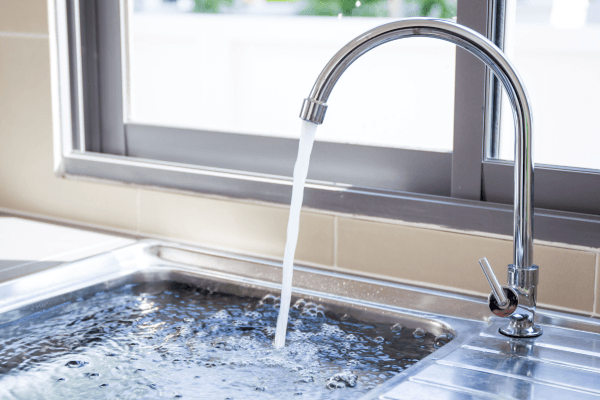
Imagine you’ve just cooked a delicious bacon and egg breakfast in your Columbus, Ohio home. What do you do with the remaining bacon grease as you wash the dishes? It can be tempting to dump the grease down the sink. It’s hot and it’s a liquid, so it’ll wash right down the drain, right?
Wrong!
Bacon grease (and other cooking oils and fats) can cause serious damage to your kitchen drain and the pipes below. In this article, we’ll explain what happens when you pour grease down the sink, and what you can do with your remaining cooking oil.
What Makes Cooking Oils Solidify?
Every cooking oil or fat will solidify once they are cooled. For instance, if you put your cooking oil in the fridge, you will see that it starts to turn cloudy at around 40 degrees Fahrenheit.
Cooking oils are a mixture of fatty acids and fats, each with a unique solidifying temperature. Saturated fats have a higher freezing temperature than unsaturated fats. The majority of fats are solid at body temperature, but unsaturated fats stay liquid at lower temperatures.
Bacon fat, cooking oils, and grease will congeal and harden at room temperature, causing serious plumbing issues over time if you pour it down the drain.
Clog Formation
If you continue to pour grease down the sink, clogs will begin to form as the oily substance solidifies into a tough-to-clear clog. Over time, the clog will block the pipe, causing these plumbing problems in your home:
- Water backups into your sink or dishwasher
- Bad odors
- Structural damage to the pipes
If the clog forms in the sewers, rather than in the pipes in your home, it can become part of huge fatty acid and glycerol masses that adhere to the sides of sewer pipes, eventually creating serious sewage issues, not only for you but for the entire neighborhood. These fat and grease clogs have gotten so big in some areas that city workers had to use shovels to remove them.
If your sink isn’t draining properly, it’s a good idea to have a plumber check it out. By calling the experts at Apex Plumbing, Heating, and Air Pros to clean your clogged drain, you can prevent issues like bad smells, slow drains, and cracked or burst pipes.
Many People Still Pour Bacon Grease Down the Drain
Although there have been several campaigns to stop people from pouring grease down the sink, many still do it. Others pour it down the toilet without realizing that the grease will still solidify as it cools down, causing fat to coat the sides of your water lines. With time, it will build up and narrow the pipe openings.
Grease Buildup on Your Residential Pipes
Although it may be convenient to dump oils or bacon fat down the drain, you’re putting your residential plumbing and the city's plumbing at risk every time you do so.
Grease is sticky and nonsoluble. As it clings to the pipe walls, it grabs any other debris that you wash down the drain, causing serious blockages. Contrary to popular belief, running hot water or “grease cutting” soap down the drain will not flush all the grease out of the drain. You may have some minor success using a vinegar and baking soda combination. However, if you’re dealing with a sizable and unresponsive oil or grease blockage, give Apex Plumbing, Heating, and Air Pros a call. We have the tools and experience to fix a drain clog.
Grease Disposal Containers
One easy alternative to pouring grease down the drain, sink, or toilet is using a grease disposal container. There are a variety of grease-trapping products available at retail stores and online, but you can also use any heat-safe glass jar, tin can, coffee can, or bottle you choose.
Just pour the leftover hot grease into the container after cooking, before you wash your dishes. Once the container is full, let it cool and harden, then throw it into your kitchen trash. Do not put congealed grease into the garbage disposal.
Eco-Friendly Disposal Methods
Cooking oil can be reused and bacon grease can last up to three months when stored in an airtight container in the fridge. This means you can save your grease and oils, refrigerate or freeze them until they are solid, and cook with them again. Not only will you keep your drains in peak condition, but you will also save money.
Some other grease disposal and reduction methods recommended by the City of Columbus include:
- Use old paper towels, newspapers, or flyers to absorb the grease and throw them in the trash
- Use less fat at the outset, opting for shallow frying, air frying, or roasting over deep frying
- Sautee foods using less oil than the recipe calls for
- Trim the fat off of cuts of meat before cooking or choose leaner cuts at the store
Some of the more creative uses for grease include:
- Reuse the grease to make soap, candles, and other home goods
- Donate your used cooking oils for biofuel (if you have the option in your area)
- Drizzle a couple of drops of bacon grease onto a pet’s treats
- Add a small amount to your compost heap (and aerate often)
It’s not recommended to dump leftover grease and oil outside on the ground or feed it to wildlife. Some oils can be toxic to plants and animals, grease can infiltrate water supplies, and oils can get on birds’ wings and prevent them from flying normally. If you do not want to reuse your kitchen grease, local recycling programs may offer to collect excess oil to prevent it from ending up in your drains.
While most households may not be up to creating their own biofuel, anybody can handle dumping grease into a coffee can. Prevent plumbing problems, and save yourself the hassle, and the money, of a clogged drain by using responsible disposal methods.
Work With Top-Rated Plumbers
Homeowners and business owners in Columbus, Ohio can rely on Apex Plumbing, Heating, and Air Pros for all of their plumbing needs. Our services include water heater repair, tankless water heater installation, bathroom remodeling, and commercial plumbing.
We offer a free, no-obligation estimate, and our work comes with a five-star satisfaction guarantee. If you want your plumbing work done by friendly, efficient professionals, call Apex today.
Expert Drain Cleaning Services at Apex
Washing grease down the sink can only be an “out of sight, out of mind” scenario until the congealed fat starts to cause issues in your kitchen. If you’ve noticed slow draining, funny smells, or backing up occurring in your kitchen (or anywhere in the home), call Apex Plumbing, Heating, and Air Pros.
Our professional team will be there quickly to assess the issue and restore your drains to good working condition, fast. Whether you want a drain inspection or need an emergency repair, we’ll have one of our dependable plumbers at your home as quickly as possible.
Call Apex Plumbing, Heating, and Air Pros For All Your Plumbing Needs
If you have poured bacon grease or oil down the drain, don’t worry. At Apex Plumbing, Heating, and Air Pros, we do it all, from drain cleaning to burst pipe repair and sewer video inspections.
We take pride in our customer service, and we invite you to see for yourself why so many people in the Franklin, Delaware, and Fairfield counties turn to us for their plumbing needs. Contact us today to learn more or to schedule an appointment. We are looking forward to working with you.
Frequently Asked Questions
What happens when you put grease down the sink?
When you put grease down the sink, it cools and congeals, causing a hardened blockage that sticks to the inside of drains and pipes and traps other debris and fat, resulting in clogs.
How long does it take for grease to clog a drain?
The time it takes for grease to clog a drain depends on the size of the pipes, the shape of the drain, and the type and amount of grease. It can take anywhere from a few weeks to several months to have a noticeable effect on your drainage.
What do you do if you accidentally pour grease down the drain?
If you accidentally pour a small amount of grease down the sink, don’t panic. Even if it happens a few times, as long as you have your pipes cleaned regularly, your drains should work fine. You can also have a plumber use a drain snake or sewer jetting method to blast clogs away with water if you notice any issues.
Is it OK to wash a little grease down the drain?
No, even if you pour a small amount of grease down the sink, it can congeal and start to cause issues in your kitchen’s drain and the connected pipes.
Are there signs to indicate your drains are clogged due to grease buildup?
Yes, some signs that your drain is clogged due to grease buildup include slow draining, unpleasant odors coming from the drain, or water backing up into your sink. A clogged drain can also cause a pipe to burst if it’s not fixed in time.
Can you use any household items to help break down grease in your drains?
To break down a small amount of grease in your drains, you can try a mixture of vinegar and baking soda. Chemical drain cleaners can be toxic and can damage pipes, while other home remedies like boiling water or grease-cutting soap do not work. The most effective method is calling a professional who can assess the issue and safely solve the problem without using harmful chemicals.
How often should you have your drains professionally inspected to prevent clogs?
It’s recommended that you have your drains professionally inspected every one to two years to prevent clogs from occurring, even if you’re diligent about proper grease disposal.





